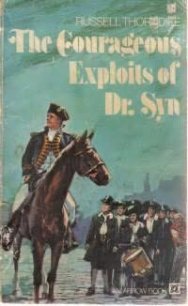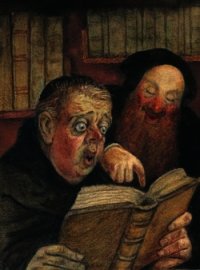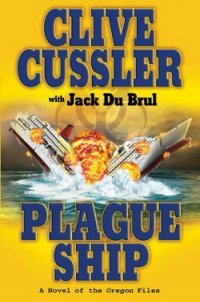Doctor Syn on the High Seas - Thorndike Russell (читать лучшие читаемые книги TXT) 📗
was not long in doubt.
“I am Esther Sommer ’s father,” he said, in a hoarse whisper. “I have
come to
- 42 -
put Paid to your account.”
A flash, a deafening report, and then, amidst a stench of gunpowder,
they saw the Squire’s great body crumple down the boards. Nothing moved
save the twitching of his sword-hand and the curling smoke from the
steady barrel of the pistol.
It was a strange voice that brought the onlookers back to a state of
reality.
“This looks to me like murder.”
The speaker, who was quietly closing the door through which he had
entered, was richly dressed. He was short in stature, but broad shouldered and heavily built. His complexion was browned from foreign
sun, and his gold ear-rings indicated the sea as a profession. Unlike
the prevailing fashion, he wore his hair short-cropped and his black,
pointed beard gave him more the appearance of an Elizabethan than a
Georgian. While he smiles, as he was doing then, and showed his fine
white teeth, he was not unattractive. About the age of Doctor Syn, he
looked older, for he had lived hard and run the pace. His bearing
conveyed a recklessness which to feminine eyes at least appeared
romantic. Booted and spurred, he carried his riding cloak over his arm,
but as he advanced easily into the circle of light he tossed it from him
to a distant chair. It was then that Imogene recognized him, for with a
cry of joy she sprang forward, seized his hands in hers and said,
“Nicholas!”
“Of course,” observed Syn to Tony. “It is the Squire’s nephew.”
“And come in the nick of time to close my uncle’s eyes, it seems.”
His manner was almost jocular as he set the girl aside, with a
friendly patting of her hands, and surveyed the dying man upon the
floor.
Not even the pains of death which gripped him could disguise the
hatred of the Squire as he asked, “Have you come to crow at my death,
young cockerel?”
“I hurried from Spain, sir,” replied the nephew, “in response to your
last letter threatening to cut me off from the estate. I took the
precaution of calling upon the family lawyer in London, and no doubt you
will be desolated to learn that you have no means of carrying out such a
piece of petty spite. He was setting out for Oxford tomorrow in order to
inform you of this himself, but, as you see, I have forestalled him with
the good news.”
“I would have made him find the means,” replied the Squire.
“I rather think that the little misfortune which I see you in, dear
Uncle, will give me the estate within the hour. I have seen death writ
on faces before now.”
“Aye, I am done for this time,” went on the Squire, speaking with
increasing difficulty. “Had I lived tonight, I would have married the
girl, whom you had lost to the parson there. I warrant her child have
been a bar to your inheritance.”
“What does he mea n, Imogene?” asked the nephew.
“It means, Nicholas, that I am betrothed to Doctor Syn,” she
answered. “Tonight my mother and myself were brought here forcibly, but
Doctor Syn and Mr. Cobtree came to rescue us. Your uncle tried to kill
my lover, who pr oved himself the better swordsman. Indeed, your uncle
was disarmed when the shot was fired.”
Nicholas looked at the man who still held the pistol. “Why, it’s
Sommers. You lived across the river. I remember. You had a daughter.
I warned my uncle at the time that his peccadilloes would get him into
trouble. I think I heard she died.”
“Aye,” replied Sommers. “He killed her.”
- 43-
“So you kill him,” said Nicholas. “Well, all I can say, my friend,
is that you are in something of a fix. A duel’s a duel, and murder’s
murder.”
“I’ll swing for it if needs be. I am glad,” replied Sommers.
“Tut, man, let’s have no more corpses. While uncle obliges me by
dying as quickly as he can, I’ll think what’s best to do.”
As a reproof to his c allous hatred for his uncle, Doctor Syn took
cushions from chairs and propped the dying man into a more comfortable
position.
“Leave me alone,” said the Squire. “But give me wine.”
Imogene poured it out and took it to him. He tried to drink, but
could not. Instead he muttered to her through his clenched teeth:
“Will you tell me something, child?”
“What is it?” answered Imogene.
“That fellow Sommers,” he went on with an effort. “Regard him well,
and tell me how came such an ugly devil to possess so beautiful a
daughter. Yes, Sommers, your Esther was a pretty wench. I wonder now if
I’ll meet the jade?”
They were his last words. Doctor Syn knelt by him and felt the
heart. Then he slowly rose and said, “He is dead.”
“Well, I’ll be no hypocrite,” said Nicholas. “I always hated him.”
He picked up the dead man’s waistcoats and felt in the pockets. In
one of them he found a key, which he carried to a cabinet by the
fireplace. This he unlocked and searched amongst the many papers it
contained. At last he lit on a document, which he opened in haste. He
scanned it through and then said aloud, “To my nephew Nicholas Tappitt,
all my estate.” Then he looked at the others with a smile and added,
“So the rascal did not alter his will. My visit to the lawyer was not
true. I said it to frighten him. I think he could have left his money
where he would. However, it seems that I am safe. And now, gentlemen,
let us see about giving him a more regular death than he enjoyed. If
you gentlemen will agree to my plan, there will be no question of
murder. At dawn tomorrow Doctor Syn, with Mr. Cobtree here as second,
will meet my uncle in an affair of honour. As his nephew I will act for
him. I know a surgeon in the town who for a purse of guineas wi ll keep
his mouth shut, and certify death as regular. We’ll play the farce in
Magdalen Fields. It would seem a natural meeting-place. No possible
blame can fall on Doctor Syn for killing him, unless it is a rap over
the knuckles from the University Authorities. What do you say?”
The effrontery of this suggestion seemed to the others so
preposterous that they at first emphatically refused. But gradually
Nicholas made them see that only by such means could Sommers be saved
from trial.
“You may safely leave this to me to carry through,” said Nicholas.
“All you have to do is escort the ladies back to Oxford, and await me at
dawn in the Fields.”
“But why in Magdalen Fields,” asked Cobtree. “It could be managed
better here.”
“The pistol-shots must be heard in a more public place,” explained
Nicholas. “It will be the publicity of the affair that will deceive. I
will bring the body by coach. The surgeon and I will lay it on the
sward. Doctor Syn and I will fire the pistols into the air. The corpse
will be lifted back into the coach, and Sommers is at liberty to stay in
bed if he wishes. As to my servants here, they will obey me implicity.
They ever had a good regard for me, and hated my uncle. Let us release
your mother, Imogene, and I will send you by coach back to Oxford.”
- 44 -
“The dominance of Nicholas succeeded, and since nobody had a better
plan, they all took an oath of secrecy and agreed to carry out the grim
game. Vastly relieved at his salvation and accomplishment, the man
Sommers went the way he came, by boat. They found Imogene’s mother in
sad condition. The terror which she had gone through, added to the
physical pains from the brutalities that had been practiced on her, had
affected her poor brain, and they took her back to White Friars only




